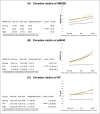Heart Rate Variability Analysis to Investigate Autonomic Nervous System Activity among the Three Premature Ventricular Complex Circadian Types: An Observational Study
- PMID: 39897136
- PMCID: PMC11779668
- DOI: 10.47895/amp.vi0.8356
Heart Rate Variability Analysis to Investigate Autonomic Nervous System Activity among the Three Premature Ventricular Complex Circadian Types: An Observational Study
Abstract
Background and objective: Premature ventricular complex (PVC) burden exhibits one of three circadian types, classified as fast-type, slow-type, and independent-type PVC. It is unknown whether PVC circadian types have different heart rate variability (HRV) parameter values. Therefore, this study aimed to evaluate differences in HRV circadian rhythm among fast-, slow-, and independent-type PVC.
Methods: This cross-sectional observational study consecutively recruited 65 idiopathic PVC subjects (23 fast-, 20 slow-, and 22 independent-type) as well as five control subjects. Each subject underwent a 24-hour Holter to examine PVC burden and HRV. HRV analysis included components that primarily reflect global, parasympathetic, and sympathetic activities. Repeated measures analysis of variance was used to compare differences in HRV circadian rhythm by PVC type.
Results: The average PVC burden was 15.7%, 8.4%, and 13.6% in fast-, slow-, and independent-type idiopathic PVC subjects, respectively. Global, parasympathetic nervous system, and sympathetic nervous system HRV parameters were significantly lower in independent-type PVC versus fast- and slow-type PVC throughout the day and night. Furthermore, we unexpectedly found that tendency towards sympathetic activity dominance during nighttime was only in independent-type PVC.
Conclusion: The HRV parameters are reduced in patients with independent-type PVC compared to fast- and slow-type PVC. Future research is warranted to determine possible differences in the prognosis between the three PVC types.
Keywords: autonomic nervous system; circadian rhythm; heart rate variability; premature ventricular complex.
© The Author(s) 2025.
Conflict of interest statement
All authors declared no conflicts of interest.
Figures




References
-
- Asatryan B, Seiler J, Bourquin L, Knecht S, Servatius H, Madaffari A, et al. . Pre-procedural arrhythmia burden and the outcome of catheter ablation of idiopathic premature ventricular complexes. Pacing Clin Electrophysiol. 2021. Apr;44(4):703–10. doi: 10.1111/pace.14211. PMID: 33675240. - DOI - PubMed
-
- Parreira L, Marinheiro R, Amador P, Mesquita D, Farinha J, Lopes A, et al. . Frequent premature ventricular contractions: association of burden and complexity with prognosis according to the presence of structural heart disease. Ann Noninvasive Electrocardiol. 2021. Jan;26(1):e12800. doi: 10.1111/anec.12800. PMID: 32964593; PMCID: . - DOI - PMC - PubMed
LinkOut - more resources
Full Text Sources
